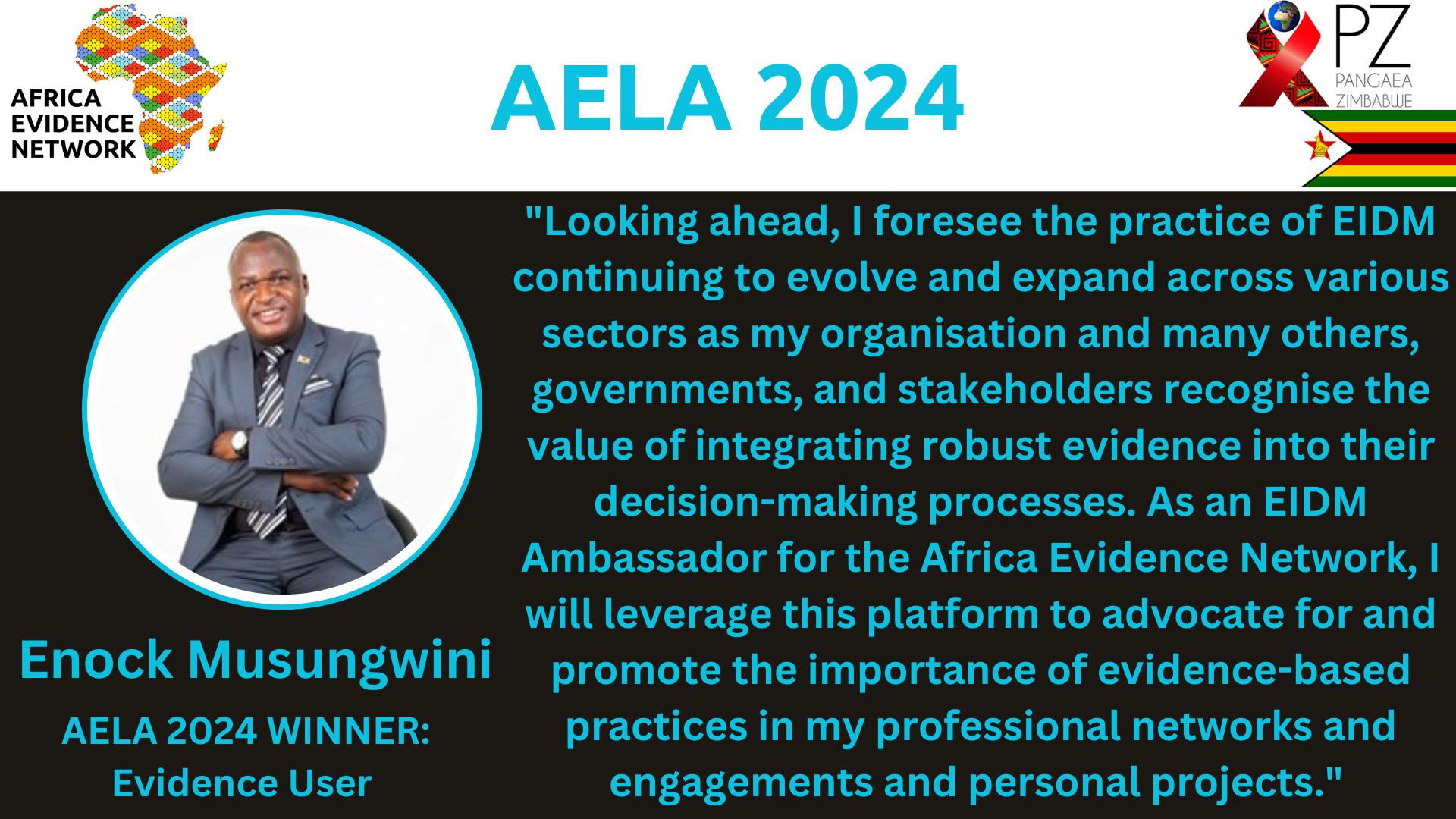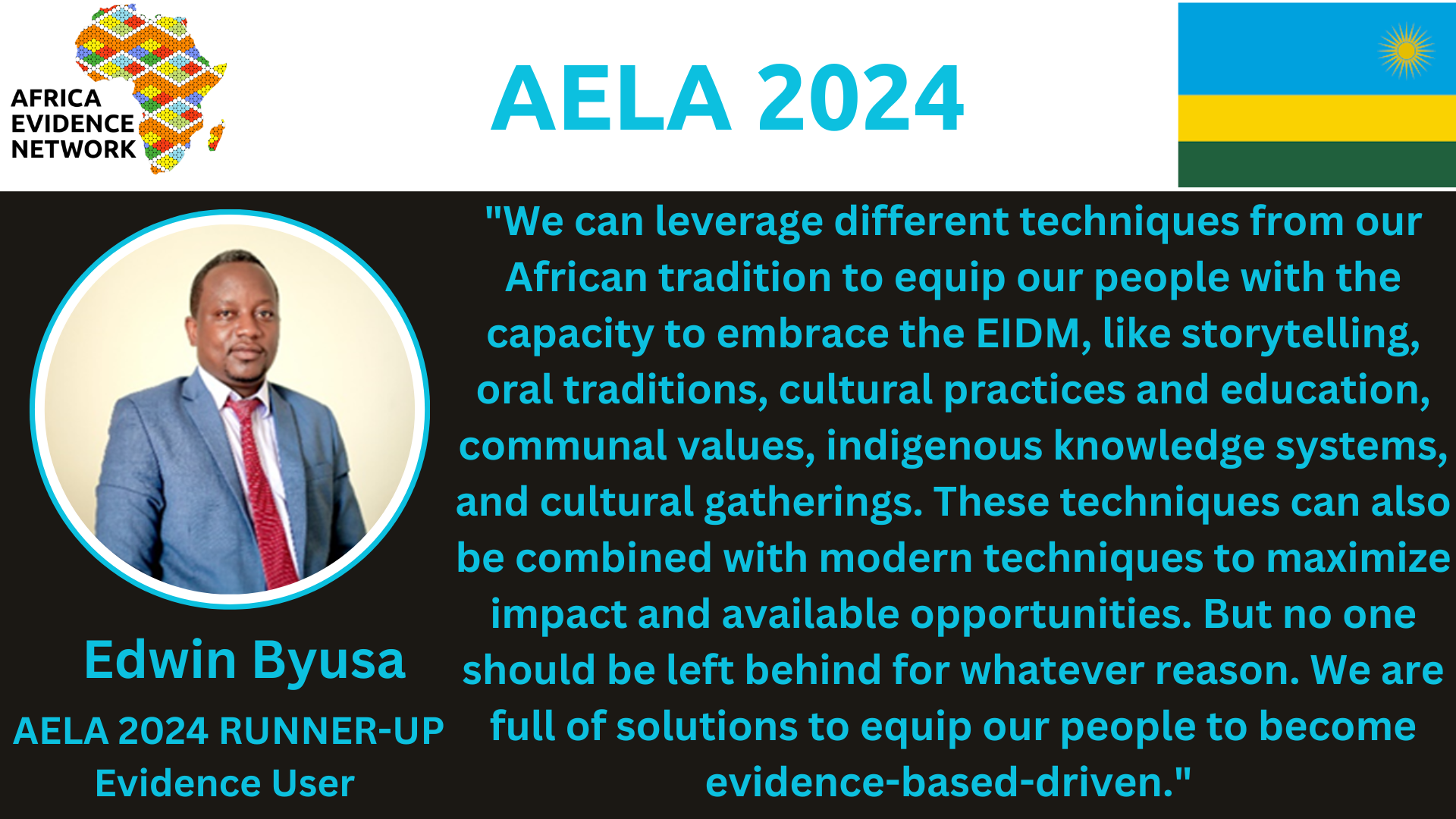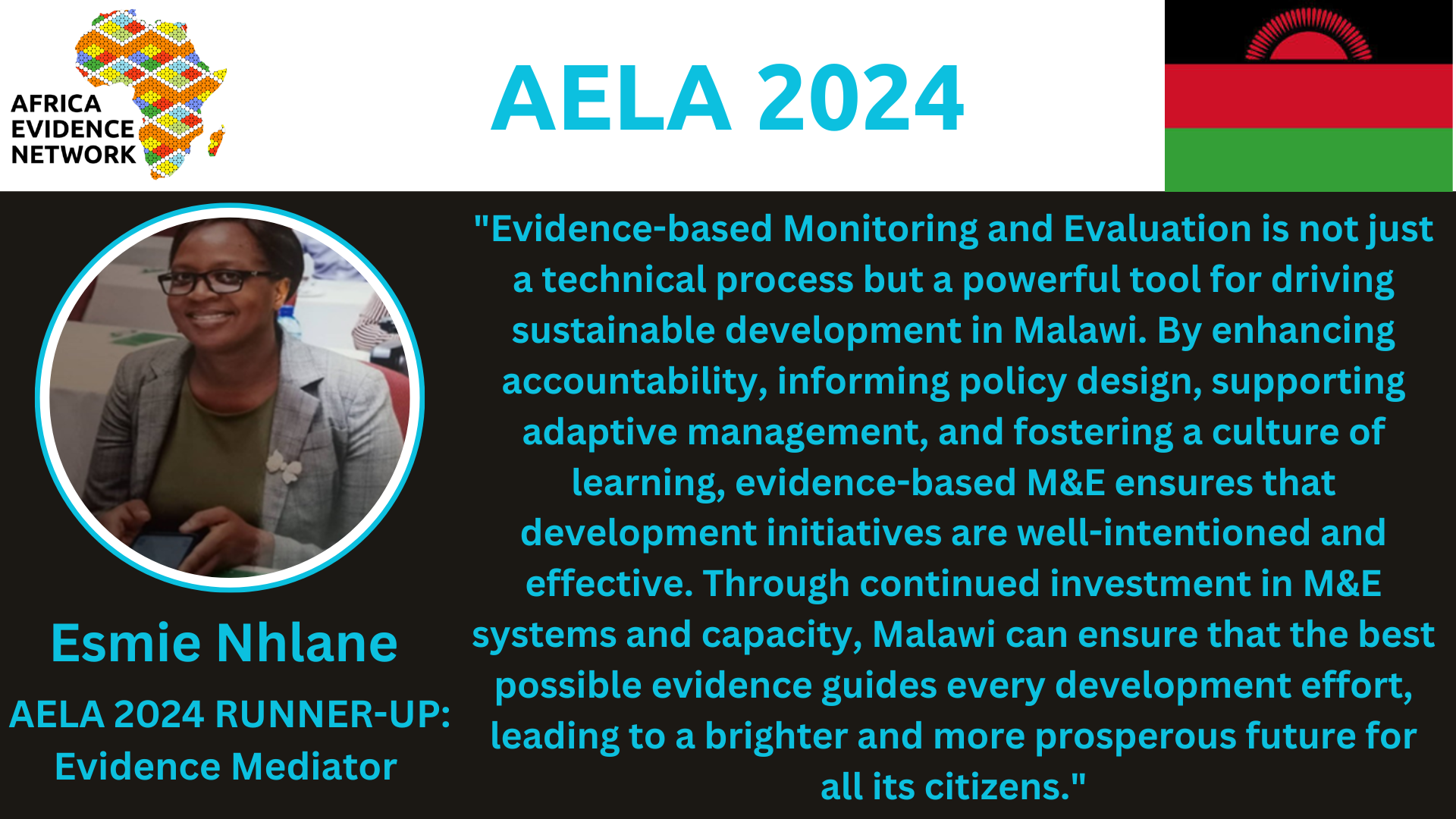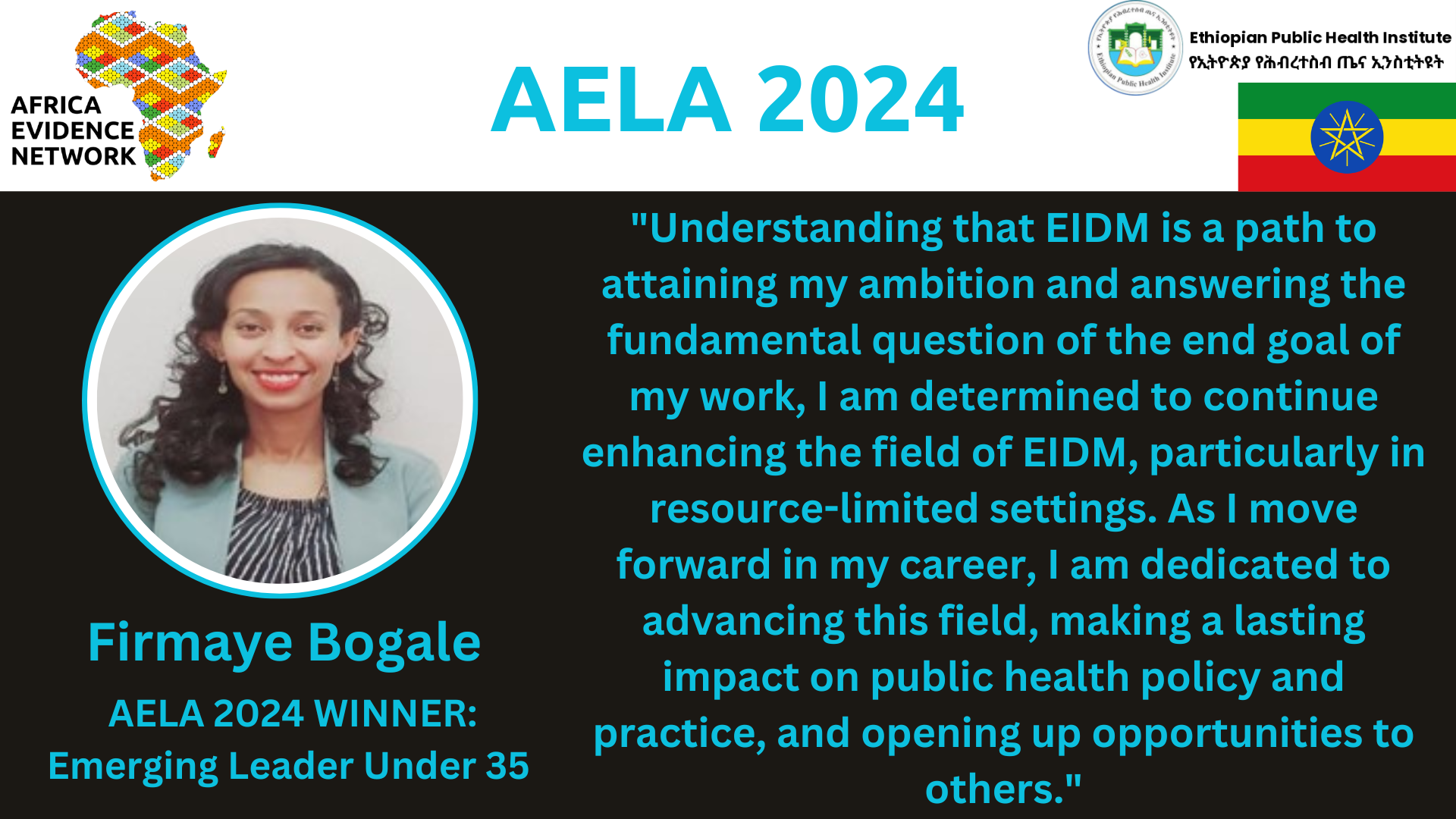
Enock Musungwini is the recipient of the Africa Evidence Leadership Award 2024 in the Evidence User category offered by the Africa Evidence Network. We asked Enock to reflect on his work.
How the AEN shaped my view of evidence-informed decision-making (EIDM)
The evidence-informed decision-making (EIDM) definition by the Africa Evidence Network[1] highlighting that it is the application of the best available evidence by people, practitioners and or organisations to inform their decisions inspired me to have an action-oriented approach to advocating for EIDM. In the development context, EIDM is most often associated with decision-makers and policymakers in the public sector, but I have also experienced its critical role in civil society. Practising EIDM is vital in development work as it moves beyond good intentions and plausible theories to empowering citizens, practitioners, and policymakers to base their efforts and decisions on reliable evidence. In my public health field of practice, EIDM seeks to ensure that health policies and programmes are informed by the best available research evidence, which is identified and appraised through systematic and transparent processes. The World Health Organisation[2] spells that EIDM entails identifying, appraising, and mobilising the best available evidence for safe and effective health policy and programmes. Furthermore, EIDM is key to the World Health Organisation’s science-based mandate and the UN 2030 Agenda for Sustainable Development. From my practice perspective, EIDM ensures that organisations and programme policies, operations and practices are informed by rigorous data and the best available evidence, thereby enhancing the effectiveness and efficiency of their work’s interventions.
When I first joined the Africa Evidence Network (AEN) in 2015, my understanding of Evidence-Informed Decision-Making (EIDM) was primarily theoretical. However, through my involvement with the AEN Reference group, communities of practice, enhancing evidence capacities workstream and one-on-one with the esteemed AEN staff, I have come to appreciate the practical applications and transformative power of EIDM in addressing real-world challenges. The network and staff at AEN have not only deepened my knowledge, understanding and appreciation of EIDM but also provided a platform for high-level networking, engaging with like-minded researchers, practitioners and EIDM champions as well as practical engagement and application of EIDM principles in my NGO and public health field. I developed my writing, publication, and blogging skills with links to EIDM and other links to public health-related publications.
How I have experienced EIDM contributing to better outcomes in my practice at work, personal engagements and professional networks
I have witnessed EIDM contributing to better outcomes in health policy and health systems, including practice, because when these are informed by robust evidence and reliable data, they are more likely to address the root causes of issues more effectively, thereby improving the overall quality of life. In my line of work and sector (public health), programme interventions based on strong evidence lead to more effective disease prevention, better patient outcomes, and improved public health strategies. I have experienced EIDM enhancing efficient and effective resource allocation by identifying what works best and avoiding allocating resources to ineffective or suboptimal interventions. This is more critical in resource-constrained settings like LMICs, Zimbabwe, and most African countries. In health systems governance, I have also realised that EIDM enhances accountability and transparency in decision-making processes because decisions are based on solid evidence, making it easier to track and justify the choices made. Improved transparency and accountability thus foster trust among stakeholders. Additionally, I have realised that EIDM enhances credibility as policies and practices informed by evidence are generally perceived as more credible and trustworthy and are more likely to be supported and endorsed by key stakeholders and funders.
Leading an internal evaluation of Pangaea Zimbabwe’s Wild4Life Health Programme
In 2022, as part of my programme management role at Pangaea Zimbabwe, I led an internal evaluation of the Wild4Life health program to assess the program alignment with Pangaea Zimbabwe and the Ministry of Health plans, priorities and health outcomes. The review involved rigorous qualitative and quantitative data collection, verification, validation, and triangulation of data to ensure the accuracy and reliability of our findings. This experience was a significant turning point in my practical understanding of EIDM as the results and observations from data analysis and audits, qualitative feedback, and insights from key informants like District Medical Officer, District Nursing Officer and health facilities staff helped me better understand the project and also improving the approach and implementation of the project. Utilising the skills and methodologies I had learned through AEN, we identified success areas, best practices, critical gaps and areas for improvement in the program. This evidence-based approach improved the program’s effectiveness and demonstrated to our stakeholders and funders the value of making decisions grounded in solid evidence.
Successful resource mobilisation and improved quality of reports
Through engagement with AEN and a better understanding of EIDM, I successfully secured grants for the Wild4Life program and Pangaea Zimbabwe. Improved writing skills, good packaging and use of evidence from the Wild4Life program successes because of better understanding and application of EIDM, which motivated current and new funders to continue to support the program and come on board to fund like the new Pangaea Zimbabwe ZIMACE project. This resulted in me being awarded the Brand Ambassador and Growth and Innovation awards by Pangaea Zimbabwe in June 2023.
Continued capacity building with ZEIPNET and ARIN Fellowship
Recognising the importance of capacity building, I recently participated in a two-week training as an ARIN Fellow in April 2024. I continue working on a systematic review mentorship that will culminate in publishing a policy brief and paper. This training and my collaboration with the Zimbabwe Evidence Informed Policy Network (ZeipNET) allowed me to work closely with policymakers such as the Parliament of Zimbabwe and the Ministry of Health, as these engagements were practical applications of EIDM.
Advocacy in public through and recognition by HIFA
My role as the Country Representative for Healthcare Information for All (HIFA) from 2021 has been another practical application of EIDM. In this capacity, I have represented HIFA and worked to disseminate accurate and evidence-based health information across Zimbabwe, Africa and beyond. In 2022, I was awarded the HIFA Country Representative of the Year, an accolade that recognised my efforts in promoting evidence-informed health practices and information dissemination. Through HIFA, I have engaged in various public health advocacy initiatives, using evidence to drive campaigns on public health advocacy issues. These experiences have shown me the real-world impact of EIDM in improving public health advocacy and outcomes and enhancing the credibility of health information. In May 2024, I was appointed Global coordinator for HIFA Supporting Organisations, recognising my immense role in advocating and supporting Evidence-based and accurate healthcare information dissemination and practices within HIFA and beyond.
Continued research and teaching
As a freelance Research Assistant with the International Centre for Evidence in Disability at the London School of Hygiene and Tropical Medicine (LSHTM), I have been involved in developing an evidence brief on the most effective strategies for preventing visual impairment among older people in Africa for Disabled Persons Organizations in LMICs including Zimbabwe and Africa on various disability thematic areas and topics. This work has provided me with a practical perspective on the importance of evidence in shaping inclusive and effective disability policies. Additionally, my role as a visiting lecturer at the Women’s University in Africa allows me to impart EIDM principles to students, scholars and other esteemed academic colleagues, emphasising the importance of integrating evidence into their future work. These teaching experiences have solidified my understanding of EIDM and highlighted the need for continuous learning and adaptation in the face of new evidence.
Serving as Pentacell and Alumni ambassador for the London School of Hygiene and Tropical Medicine
Appreciating the role of enhancing capacity and mentorship principles under EIDM, I have served as an Ambassador and Pentacell ambassador for the London School of Hygiene and Tropical Medicine (my alma mater), giving one-on-one support, mentorship and support to incoming MSc Public Health students at LSHTM and to date I have supported, mentored and inspired more than 20 students from Africa, Asia and Europe.
Expanding EIDM's role to science advice and diplomacy as a Steering committee member with the International Network for Governmental Science Advice (INGSA) Africa chapter
My growth in and contribution to EIDM with AEN saw me appointed to the INGSA Africa chapter steering committee member in 2021, serving along eight other esteemed members from Nigeria, Uganda, Cameroon, South Africa, Egypt, Mauritius, Tunisia, Senegal, DRC and Ghana.
My Future in the EIDM Space
I am deeply grateful for the Africa Evidence Leadership Award – Evidence user category, as this award validates the efforts I have dedicated to Evidence-Informed Decision-Making (EIDM) and serves as a powerful catalyst for my future endeavours in this vital field. Looking ahead, I foresee the practice of EIDM continuing to evolve and expand across various sectors as my organisation and many others, governments, and stakeholders recognise the value of integrating robust evidence into their decision-making processes. With the advent of technology, we can anticipate a more systematic and widespread use of digital tools and platforms to gather, analyse, and disseminate evidence more efficiently. In my role, I am committed to being at the forefront of this evolution. As an EIDM Ambassador for the Africa Evidence Network, I will leverage this platform to advocate for and promote the importance of evidence-based practices in my professional networks and, engagements and personal projects. At my work at Pangaea Zimbabwe, I will continue integrating EIDM into proposal development, project design, planning, implementation, monitoring and evaluation, ensuring that all interventions are grounded in solid evidence. By leading by example, I aim to inspire my colleagues, workmates and peers to embrace EIDM in their work. Within my professional networks, I will actively participate in and contribute to communities of practice, conferences, and collaborative projects focusing on EIDM. Sharing knowledge, experiences, and best practices with other professionals will be crucial in building a robust EIDM community. Furthermore, I will continue to research, write, and present on EIDM topics to raise awareness and drive the conversation forward. On a personal level, I am committed to lifelong learning and continuous improvement in the realm of EIDM. I will mainstream and anchor EIDM in my ongoing PhD in public health studies.
About the author: Enock Musungwini is a seasoned public health professional, health management consultant, and development practitioner, currently serving as a Programme Manager (Consultant) for the NGO Pangaea Zimbabwe. Enock is pursuing a PhD in Public Health at UNICAF University, specialising in Public Health Policy and Financing. He holds an MSc in Public Health (MPH) with a Research award from the London School of Hygiene and Tropical Medicine in the UK, obtained under the prestigious British Chevening scholarship (2018-19 cohort). Additionally, he has earned a Master's in Business Administration (MBA) and a BSc Hons in Psychology, among other qualifications.
Enock has been a driving force in promoting evidence-informed policies and practices at Pangaea Zimbabwe and in past engagements as he led an internal evaluation of the Wild4Life health programme at Pangaea Zimbabwe in 2022 and drafting programme proposals, reports, and abstracts. His expertise in data verification, validation, and triangulation ensures accurate evidence documentation for programme improvement and has spearheaded the design and implementation of evidence-based programmes at Pangaea Zimbabwe, resulting in him being awarded the Brand Ambassador and Growth and Innovation awards by Pangaea Zimbabwe in June 2023. Enock ensures interventions are evidence-informed and data-driven by integrating research findings into programme planning and implementation.
Recognising the importance of capacity building for evidence-informed decision-making, Enock recently participated in a 2-week training as an ARIN Fellow in April 2024. He has also collaborated with ZEIPNET as an Associate, working with policymakers such as the Parliament of Zimbabwe and the Ministry of Health on Evidence-Informed Decision Making (EIDM). Enock's involvement as a Steering Committee member of the International Network for Government Science Advice – Africa chapter highlights his commitment to promoting evidence, science advice and diplomacy across the continent. Enock's dedication to advocating for evidence-based and correct health information dissemination is evident through his role as a Country Representative in Zimbabwe for Healthcare Information for All (HIFA), where he was awarded the Country Representative of the Year for 2022 among 247 Country Representatives, and the Chevening Volunteers Gold Award from the British Foreign and Commonwealth Office in London (June 2019).
Enock is a Research Assistant with the International Centre for Evidence in Disability at the LSHTM, where he develops evidence briefs for Disabled Persons Organisations in Africa and Asia. He is a member of the Consortium for Universities for Global Health in the USA and the Royal Society for Tropical Medicine and Hygiene in the UK. Enock's impact in the academic and research spheres is evident through his prolific writing and dissemination of evidence through peer-reviewed publications, articles, and blogs. He actively presents and participates in national, regional, and international conferences, amplifying the visibility of evidence-informed decision-making principles. Enock's role as a visiting Lecturer at the Department of Family and Health Sciences at Women’s University in Africa underscores his commitment to championing evidence-informed approaches in education.
Enock's active engagement on social media platforms further extends the reach of evidence-based messages and facilitates knowledge exchange within the global health community. His leadership and dedication to advancing evidence-informed policymaking make him a respected Evidence champion. He may be reached via email at emusungwini@yahoo.co.uk. His social media contacts are on Twitter, LinkedIn, and Facebook.
Acknowledgements: The author(s) is solely responsible for the content of this article, including all errors or omissions; acknowledgements do not imply endorsement of the content. The author is grateful to Charity Chisoro for her guidance in the preparation and finalisation of this article as well as her editorial support.
Disclaimer: The views expressed in published blog posts, as well as any errors or omissions, are the sole responsibility of the author/s and do not represent the views of the Africa Evidence Network, its secretariat, advisory or reference groups, or its funders; nor does it imply endorsement by the afore-mentioned parties.
Suggested citation: Musungwini, E. (2024) Championing evidence-informed decision-making in Zimbabwe, Africa, and beyond. Blog posting on 19 July 2024. Available at: https://www.africaevidencenetwork.org/en/learning-space/article/332/
[1] Africa Evidence Network. Available at https://africaevidencenetwork.org/en/eidm-in-africa/
[2] World Health Organisation. Available at https://www.who.int/publications/i/item/9789240039872


